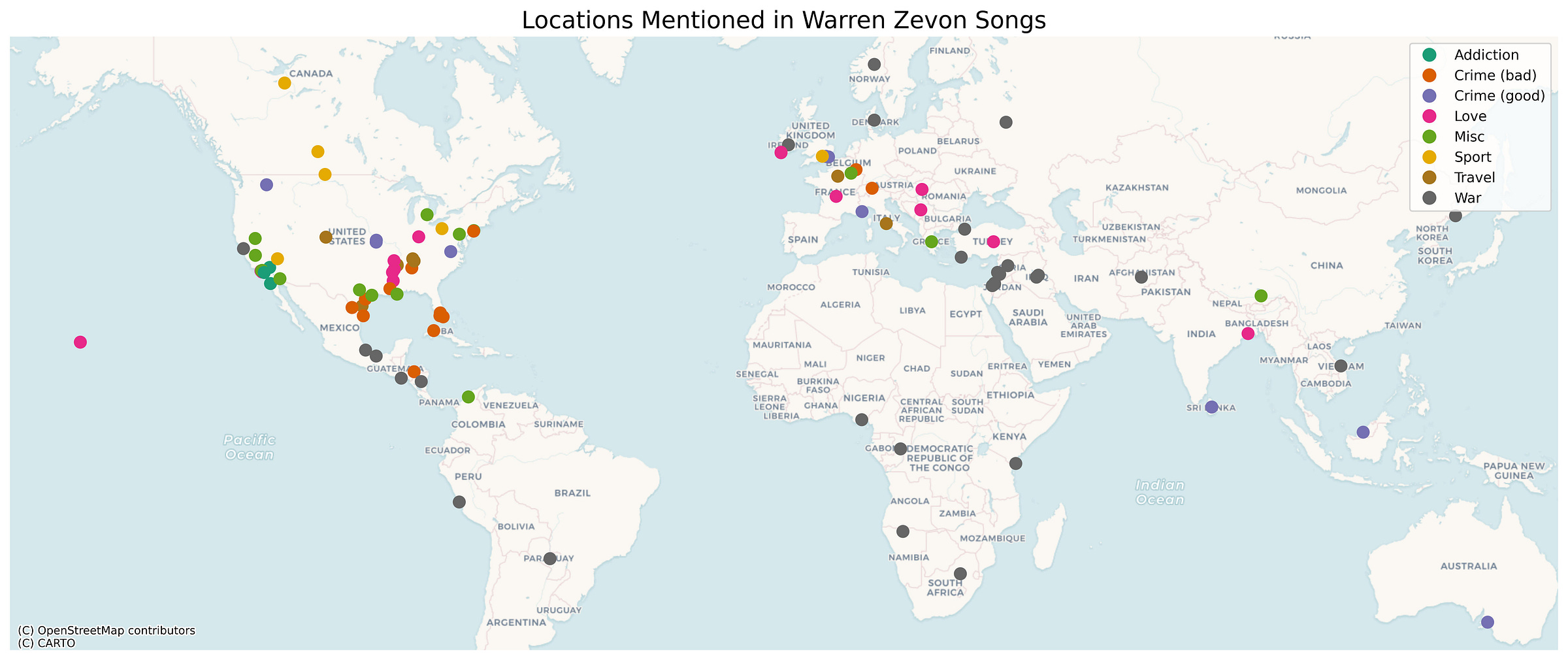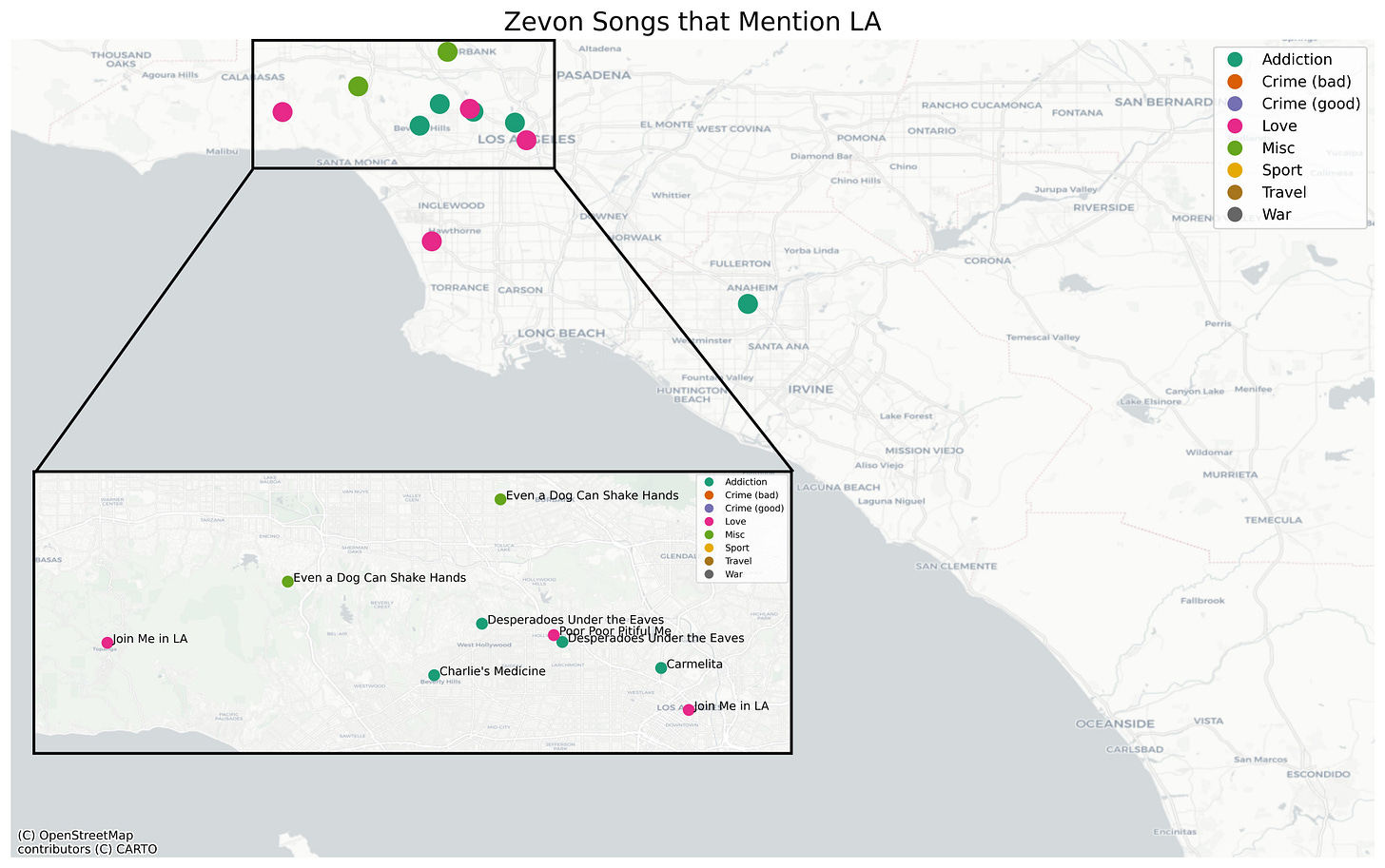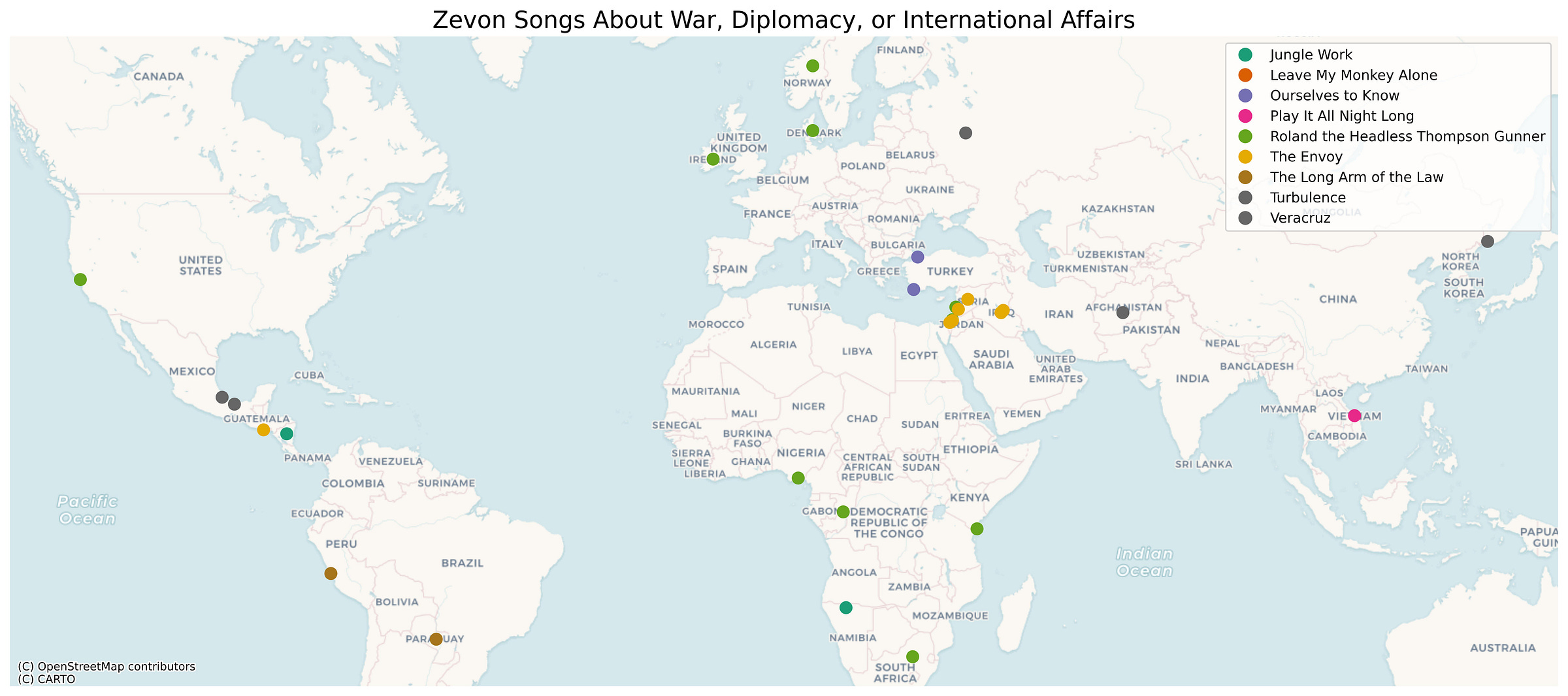Highlights from today’s post:
More mapping and visualizations from my one true musical love, Warren Zevon
The overlap between culture and geography
A generally lighter tone and, dare I say, more fun than some recent posts
But first! Need to convert geo coordinates into useful location information?
This week's edition is sponsored by OpenCage who operate a highly available, simple to use, worldwide, geocoding API based on open data. Try the API now on the OpenCage demo page.
Also, this piece has a Soundcloud playlist associated with it - have a listen!
I’ve mentioned my love of Warren Zevon in the past (see below) but since we’ve touched on some relatively grim subjects recently, I thought I’d liven things up this week with a geographic deep dive into his catalogue.
Before we get into the meat and potatoes of the post, let me just say that, whether you like his music or not, he is the musical hero we deserve at this point in time. His songs ring as true - if not more true! - today as they did in the ‘70s, ‘80s, and ‘90s when he was writing them.

Roland the Headless Thompson Gunner and Jungle Work are basically about proto-Wagner Groups. Today’s nihilistic, disaffected young men are described to a T in Excitable Boy. Anyone struggling with illness, medical debt, or generally bad times would doubtless find comfort (or at least solidarity) in the aptly-named My Shit’s Fucked Up. And, for goodness sakes, the finance bros of Wall Street or Canary Wharf are the Werewolves of London.
Anyway, I was listening to Carmelita1 on one fine summer day when I realized that Zevon mentions about 10 different locations in each of his songs. He’s a map fiend’s dream.
Moreover, given his, uh, unique songwriting themes2 I thought it would be fun to classify and map his tunes. If you’ve read any of my posts before, you know where this is going. I cracked open a fresh, cold Colab notebook and dusted off Beautiful Soup for a little web scraping fun.
It was fairly easy to scrape Zevon’s website to get all his lyrics in one place:
I went through the resulting text file, pulled out every location name, and classified the song containing the location into one of seven categories:
The graph of locations and themes he mentions in his tunes is telling, to say the least.
But we’re not here for graphs. We’re here for the sweet, sweet maps.
So here they are! Every location mentioned in a Warren Zevon song, plotted by category. A few things jump out at me from this map. Take a look at Zevon’s beloved Los Angeles, for example.
Geographically, he focuses on the tony neighborhoods that border the hills and canyons dividing Los Angeles from the San Fernando Valley. It was in these neighborhoods that he scribbled the highs and lows of life, from the strung out chords of Carmelita (“The county won't give me no more methadone / And they cut off your welfare check”) to the libertine sensibilities of Poor Poor Pitiful Me (“These young girls won't let me be”). Perhaps unsurprisingly, love and addiction are the two main themes from his songs about the city.
It’s also the city in and about which he wrote Desperadoes Under The Eaves, a gripping, maddening (and apparently true) masterpiece about him escaping the Hollywood Hawaiian Hotel on Gower Avenue. He had locked himself in the dingy motel to get clean but, fresh out of funds, left before paying his bill. He regretted it deeply — later apologizing and attempting to repay the motel — but the strings in the song deliver each sweat and shake as if you were there with him, “staring in my empty coffee cup”. Zevon leading the chorus humming along with the air conditioner toward the end nearly brings me to tears every time I hear it.
The other thing that strikes me from the world map is just how much he was a Cold War bard, singing the songs of the mercenaries and politicians who alternately pushed us toward and pulled us away from the brink of nuclear catastrophe. Note the cluster of Middle East locations mentioned in The Envoy, a tune about Jimmy Carter and Ronald Reagan’s special envoy Philip Habib, for which Habib wrote Zevon “a very nice letter of appreciation on State Department stationery”.
Though his international influences take a softer side as well. One of my favorite songs of his is Ourselves to Know. It’s a lovely, extended metaphor about, of all things, a Crusade gone wrong. Along the way, the narrator learns that the point of his exertions wasn’t to “restore the one True Cross”, nor travel to Jerusalem or Rhodes. He learns that the point of his journey was to discover himself and his comrades, not some Biblical cup. It ends with these eternal lines of advice:
Now if you make a pilgrimage I hope you find your grail Be loyal to the ones you leave with even if you fail Be chivalrous to strangers you meet along the road As you take that holy ride yourselves to know
From Veracruz to Vladivostok, Ovamboland to Saskatoon, I hope you enjoyed this dive into Zevon’s discography as much as I did! If you have any favorite tunes of his, I’d love to chat with you. Drop a comment below, tweet at me @LOActualControl or shoot me an email at lineofactualcontrol@protonmail.com.
Since I’m in the Zevon mood, would you or anyone you know read more about him? I’m kicking around the idea of occasionally writing about one of his songs, its context, and what it means to me and the world at large in another newsletter:
And remember, as the man himself said: “Enjoy every sandwich”
A hot, dusty reverie about trying to buy heroin amid heartbreak in southern California. Its evocative opening line is one of my favorites: “I hear mariachi static on my radio/and the tubes they glow in the dark/And I’m there with her in Ensenada/And I’m here in Echo Park”
This is, after all, the guy who wrote a musical biography of outlaws Frank and Jesse James.
The difference between Crime (good) and Crime (bad) is, admittedly, incredibly subjective and based almost entirely on what my sister would call “vibes”. Mr. Bad Example? Crime (good). Lawyers, Guns, and Money? Crime (bad). Frank and Jesse James? A tough call, but decided on Crime (good).
Including songs about the Cold War and, let’s say, muscular diplomacy, a la The Envoy.











Zevon’s lyrics express boundaries (e.g. Mr. Bad Example). Boundaries demarcate us from them, whether it be it personal or political. Boundaries help to appreciate our “Line of Actual Control”
Also nice to see Zevon’s lyrics be noted for something other than perhaps the greatest alliteration in the English language. Repeat after me, “ A Little Old Lady…”
Do you have a higher quality pic of the maps?